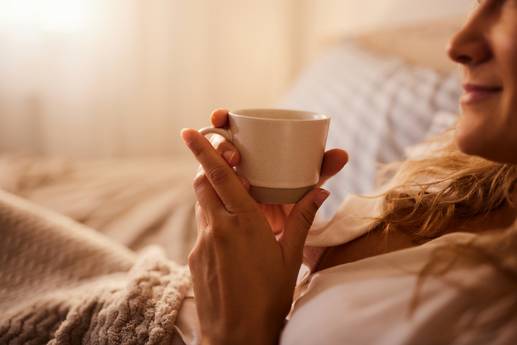Many people drink coffee after lunch to beat the afternoon slump. This is common practice, especially in everyday office life. However, this ritual can have a lasting impact on sleep.
Because even if you no longer consciously notice that you have consumed caffeine after a few hours, it is still active in the body and can prevent you from resting in the evening.
Reading tip
Look at the clock: time for the last coffee
It usually takes 15 to 45 minutes to get to one Cup of coffee Feel the effects of caffeine and feel more alert. However, it takes significantly longer for the caffeine to be completely broken down by the body.
According to the US Food and Drug Administration (FDA) The half-life of caffeine is around four to six hours.
This means that about half of the caffeine is still in the blood four to six hours after consumption.
Another four to six hours must pass until half of this remaining amount has been reduced.
A 2013 study published in the Journal of Sleep Medicine examined the effects of coffee consumed immediately, three or six hours before bed. Research suggests that ideally you should stop drinking coffee six hours before bed.
Recent findings from a meta-study that appeared in “Sleep Medicine Reviews” in June 2023 even recommend stopping caffeine consumption 8.8 hours before falling asleep in order not to impair sleep quality.
So if you go to bed at 10 p.m., you should drink your last coffee around 1 p.m.
Reading tip
Caffeine always works differently
How sensitive you are to caffeine and how quickly your body can break down the substance varies from person to person.
Age also influences how caffeine works. Even if it has not yet been clarified why, it seems that caffeine has a stronger effect in old age than in younger years.
In addition, older people find it more difficult to fall asleep.
Picture gallery: Alternatives to coffee that wake you up even without caffeine
How much and how often it is consumed also has a major influence on sensitivity to caffeine. At some point the body gets so used to it that it needs significantly larger amounts before a noticeable effect occurs.
Self-experiment: observe coffee and sleep
In order to find out how caffeine affects you, only careful introspection can help.
You might even find that caffeine has no effect at all on your sleep experience – even if you grab an espresso after a hearty dinner.
Dr. Ajay Sampat, assistant professor at UC Davis Health in California, concludes to the portal‘Self’: “If you don’t have trouble falling asleep and feel well-rested during the day, it’s okay [spät am Tag Kaffee zu trinken].”
Otherwise, as a rule of thumb, he recommends consuming your last coffee at least eight to ten hours before going to bed.
A clear guideline is to simply get into the habit of avoiding further coffee after lunch. At least coffee should be ruled out as a trigger for sleep problems.
Hide sources
source
US Food & Drug: Spilling the Beans: How Much Caffeine is Too Much?, accessed November 12, 2024: https://www.fda.gov/consumers/consumer-updates/spilling-beans-how-much-caffeine-too -much
Reading tips

